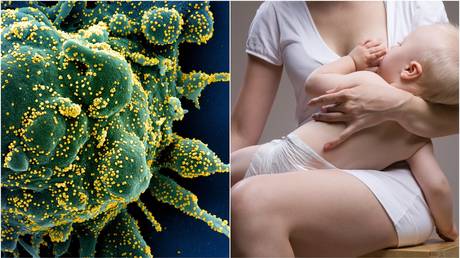
The coronavirus seems to be affecting babies less than other populations and Russian scientists suggest this may be due to proteins in breast milk that protects their immune system. Now they are trying a new drug based on it.
“We have seen very few isolated cases of babies contracting the coronavirus among millions infected with it,” Igor Goldman, a senior research fellow at Institute of Gene Biology of the Russian Academy of Sciences said in interview to the media portal News.ru. He explained that this gave his team an idea to try lactoferrin – a protein normally contained in breast milk that protests the undeveloped immune system of babies against all bacteria and viruses.
Lactoferrin essentially acts an immunity stimulant that could greatly enhance a human’s ability to combat viruses and bacteria, not only in babies but also in adults as well, the scientists believe. The Russian scientists have been looking into the medical applications of the protein for quite some time.
Together with their Belarussian colleagues, they developed a gene-modified protein identical to the human one but extracted from goat’s milk back in 2007. The protein, called neolactoferrin, is said to have anti-bacterial, anti-viral and anti-fungal properties. It has also demonstrated a decent ability to inhibit the activity of such viruses as rotavirus, hepatitis C and HIV, as part of laboratory tests. IGB specialists believe it could even help combat superbugs, bacteria resistant to modern antibiotics.
The idea to use it against a viral infection such as Covid-19 has a “scientific basis rooted in a decade-long study of neolactoferrin conducted together with the [Russian] Institute of Immunology,” Goldman said.
Now, the scientists believe that the protein could stimulate adaptive immunity in people suffering from Covid-19, relieving the severity of their symptoms. It could also theoretically protect healthy people against infection and potentially act similarly to a vaccine. This is because lactoferrin normally prevents a virus from attaching to a cell and reproducing.
Oral irrigation with a liquid containing neolactoferrin could be an effective barrier against the virus, while a pill with it could stave off development of bacterial complications, the scientists believe.
It is too early to say how effective the new drug will be in the fight against the coronavirus, immunologist Vladimir Bolibok warns. So far, the drug developers sent some test samples of the new remedy for initial trials, which received support from the Russian Federal Medical and Biological Agency – a national public health agency of the Health Ministry.
Think your friends would be interested? Share this story!




